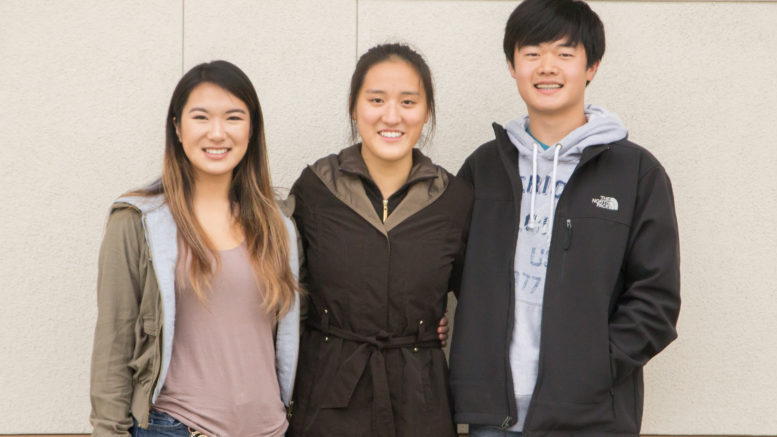By Staff Writers Julia Park & Vicki Xu
The Siemens Foundation recognized Senior Catherine Zeng as a regional finalist and Seniors Mark Choi and Meredith Mao as regional semifinalists in the Siemens Competition in Math, Science, and Technology on October 18.
Established by the Siemens Foundation in 1999, the Siemens Competition is a prestigious annual science research competition open to all US high school students. Students submit a research report, with up to eighteen pages, along with an executive summary that describes their projects’ basics in non-specialist terms. Projects are first judged at the regional tier; winners of their respective regional sections then progress onto the national tier. Scholarships for winning projects range from $1,000 to $100,000.
Zeng’s project, titled “Investigation of H/D Exchange in Aromatic Compounds with a Heterogeneous-Based Electro-Activated Palladium Catalyst,” developed methods for exchanging hydrogens in an organic molecule with a heavier hydrogen isotope, deuterium. Such a process is commercially useful in pharmaceuticals, since the hydrogen-deuterium exchange can improve the metabolic properties of drugs. Zeng said of being named a finalist, “It was actually a very unexpected title … I think I’m just proud of how much I learned and having that research experience.” Zeng will give a 15-minute online presentation on her project to judges from the California Institute of Technology on November 12. Depending on the quality of her presentation, she may advance to the national level of the competition.
Choi’s research concerned stem cells, a key interest in regenerative medicine that is currently facing ethical issues for using fetuses as a stem cell source. In his project “Effects of Polymer Substrate Composition and Morphology on Dental Pulp Stem Cell Differentiation and Properties,” he investigated developmental pathways for stem cells extracted from dental pulp. These cells, if used for medicine in the future, would bypass the ethical problem, since they come from discarded teeth instead of fetuses. According to Choi, researching the stem cell field was challenging but rewarding. “The hardest part was striking that balance between forging a new path in the field and also relying on past research to guide our project,” Choi said.
Mao explored cancer detection methods in her project “A Fast And Highly Sensitive Method For Detecting Glycoproteins In SDS-PAGE Gels Using an Aminooxy Bodipy FL Dye.” In her project, Mao improved on a dye that detects proteins on cell membranes to increase the efficiency of scanning for and monitoring cancer. Although the research process was strenuous, Mao said that “Working those 8,000-plus hours … was all worth it.” She hopes to continue conducting research and possibly approach biomedical issues from an electrical engineering standpoint in the future.
Reflecting on the three students’ accomplishments, Principal Zack Larsen said, “I’m incredibly proud of and amazed by [the finalists]. What I find so unique is that, while they’re able to describe processes and procedures in such complex terms, they’re also very human, down-to-earth kids.”
Photo by Staff Writer Vicki Xu


Be the first to comment on "Siemens Competition Names Finalists"